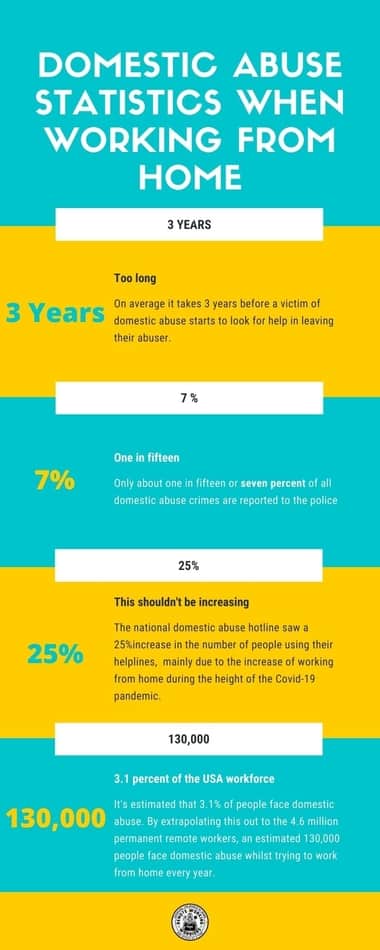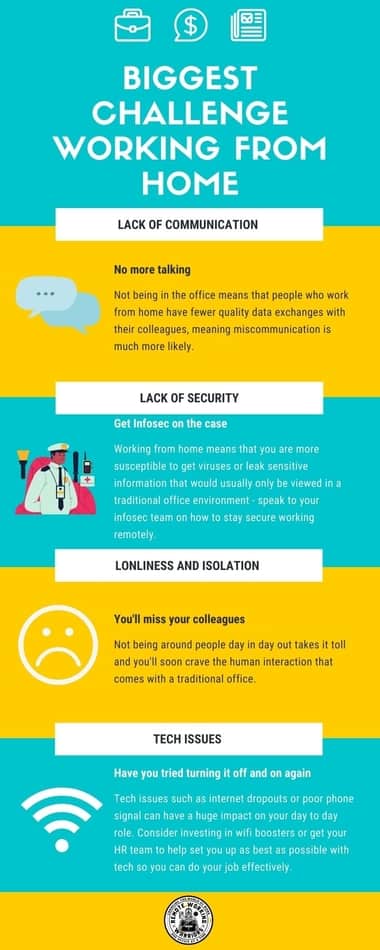This website is supported by its readers. If you click one of my links I may earn a commission. I am also a participant in the Amazon affiliates programme and I will also earn a commission from qualified purchases.

Sadly, one of the biggest problems that many remote workers face that isn’t spoken about enough is domestic abuse. With more employees working from home than ever before in part due to the pandemic, ensuring you recognize the signs of both an employer and an employee is going to be incredibly important.
Around 130,000 people who work from home permanently face domestic abuse in the USA. This is 3.1 percent of the total employees who work from home. Around 3.1% of all Americans face domestic abuse at some point in their lives, with 10 million women and men suffering from domestic abuse per year in the USA.
So what do you do if you are suffering from domestic abuse? And as an organization what are the signs to look out for if you think your employees are being abused? Keep reading to find out more.
(Now it’s worth mentioning that this post has a lot of information and so if you’re curious about the best equipment needed to work remotely simply go to my resource page here.)
Domestic Violence Working From Home
So one of the things that not enough of us talk about is domestic abuse when working from home.
Because of the stigma around it far too many people suffer in silence.
I sat down with Madihah Chowdrey, a Domestic & Sexual violence caseworker who let me know about what both employers and employees can do to tackle domestic violence.

Let’s start with the employees.
Recognize the signs
The first thing you need to do if you are suffering from domestic abuse when working from home is to recognize the signs.
According to Madihah, a lot of people have convinced themselves that their relationships are healthy when that is not the case.
So if you are coming to the realization that you are in a toxic and abusive relationship what are the signs you should keep an eye out for:
- The feeling of being withdrawn
- Feeling isolated from friends and family
- Physical bruises
- Having your finances controlled
- Not being allowed to leave the house
- Having social media and internet usage monitored
- Being belittled
- Gaslighting or being told that the abuse is your fault
- Pressurized into having sex
- Threats and intimidation
- Being made to feel worthless
- Being physically abused on a regular basis
- Feeling threatened and as though you are walking on eggshells when around your partner
- Lying to your children
- Your kids being told to pick sides
- Being bad-mouthed to your children.
As you can see some of these signs are quite subversive and are not what you would expect initially so it’s important to take note if any of these are happening to you on a regular basis.
Speak to someone who you can trust
If you feel as though you are being abused by your partner when working from home, the next thing to do is to speak to someone you can trust.
Any close friends or family who does not have a direct relationship with your partner would be a good place to start but I appreciate that for some of you reading this, it might seem as though you are unable to trust anyone.
If you are unable to trust anyone or if people you know are too connected to your partner, I would definitely recommend speaking to a specialist.
This would include the likes of the National Domestic Violence Helpline in the UK or the National Domestic Violence Hotline in the USA.
I’ve enclosed the details below:
|
Country |
CHARITY |
NUMBER |
| UNITED KINGDOM | National Domestic Violence Helpline | 0808 2000 247 |
| UNITED STATES | Domestic Violence Hotline | 1.800.799.SAFE (7233) |
| AUSTRALIA | 1800 respect | |
| CANADA | Assaulted womens helping | 1.877.336.2433 |
| NEW ZEALAND | Womens Refuge | 0800 733 843 |
| CHINA | Womens Hotline in Bejing | 010-68333388 |
| JAPAN | The Purple Dial Sexual and Domestic Violence Hotline | |
| PAKISTAN | Ministry of Human rights | 1099 |
| South Africa | Tears | 010 590 5920 |
When calling these lines, rest assured that the information you share will be confidential so let them know your background, how long the abuse has been going on, some of the signs we talked about earlier and what the next steps will be.
What’s even better is that services like the National Domestic Violence helpline will lay out some of the different options that are available to you to flee your current situation.
The Canadian Women’s Trust also came up with this fantastic visual idea to help people if they are suffering from abuse:
Safely research your options
Whilst calling up one of the above helplines is the best thing you can do to regain control of your life, a lot of you may be in a situation where you are unable to make calls.
It’s not uncommon for abusers to listen in on every call their partners make or track their internet usage.
As such then it’s important to salt research your options of getting in touch with a charity that can help.
For example, using an incognito window in order to hide any search history or using a payphone when out of the house to get in touch with a charity.
Many charities now have numbers where you can Whatsapp them instead of having a phone call. Perhaps saving that number as a friend’s name could be a safe alternative when messaging.
You can even do things such as putting a spoon down your trousers when going abroad to set off a metal detector which should give you space away from your abuser where you can speak to someone who can help.
Come up with a safety plan
Another incredibly important thing you need to do if you are suffering domestic abuse is to come up with a safety plan.
Things can move relatively quickly when you report your current situation and decide to flee and so it’s easy to overlook important documents and items that could be used against you in the future, that you will need.
For example, if you do not have access to your own finances you would need to take some proof of ID and proof of address in order to set a bank account up once you have fled your situation.
Consider e-mailing these over to yourself if you do not have direct access or storing them in a general carrier bag that will not cause any suspicion.
Go to the police
Domestic abuse crimes are often treated more seriously than other types of crimes due to the sustained damage brought upon the victim according to the CPS.
Sadly, however not enough of these crimes are reported to the police with only 1 in 15 domestic abuse crimes currently being reported.
Reporting your abuser to the police is one of the first things that you should do as it will open up the doors to be able to take control of your life whilst also ensuring that your abuser will not be able to hurt you or anyone else.
Look into getting a protection order
Another area survivors of domestic abuse should look into is to consider getting a protection order.
According to Barnes Jewish, a protection order is:
“ An Order of Protection is a document issued by a court and signed by a judge to help protect you from harassment or abuse. In an Order of Protection, a judge can set limits on your partner’s behavior. Among other things, a judge can: Order your partner to stop abusing you and your children”
Getting something like this is incredibly important for a few reasons.
First of all, if you do not have protection, your abusive partner can do things like turn up unexpectedly at your workplace unannounced or collect your children from school without needing any protection.
Taking this further it can even mean that you don’t really have any real distance away from your partner who can still be in your life.
As such, coming up with a protection order can go a long way in regaining control without the fear of your partner still being in your life.
If you are comfortable, speak to your employer
One of the worst things that domestic violence has is the stigma associated with it.
As such there are a lot of victims who still suffer in silence.
One of the best things you can do then if you are suffering from domestic abuse, leaving your partner, or recovering from domestic abuse is to communicate this with your employer.
Communicating when working from home can be notoriously difficult and communicating around sensitive topics is even tougher.
By speaking up to your employer and workplace they can help support you on the days when you are struggling to help liaise you with charities and the police to help resolve your issue.
The added benefit of communicating with your employer is that you can do so via methods of communication your partner might not expect such as through slack and email.
A lot of us feel as though workplaces are formal places that don’t shouldn’t mix with your personal life.
The truth is that workplaces are made up of people who are more likely to support you than you might think.
You can read up on how to communicate more effectively on the following posts on this blog:
- working from home vs the office
- Can working from home cause relationship problems
- Challenges of working from home
Look into alternative accommodation
Another thing survivors of domestic abuse should look into is alternative accommodation.
For some victims, their partners will have seized a lot of their assets such as the house, flat, and car and so it will be up to you to find a temporary residence until you get back up on your feet.
Keep in mind if you work full time and earn over a certain amount, you will have to pay your own way.
If you are in receipt of benefits you can approach the council about letting you into a women’s refuge.
These refuges usually consist of multiple women living in a shared living space that has access to a shared kitchen and bathroom.
Sadly, a lot of victims feel as though when they leave their abusive partners the state will take care of them, the truth of the matter is that this only occurs for those under certain circumstances.
As such, it’s important to look at nearby flats or temporary housing you can afford as you come up with a more permanent solution.
Start the recovery process
A lot of this post has spoken about what to do if you are suffering domestic abuse, the truth of the matter however is that you will get through this and when you do, it’s important to start the recovery process.
You may want to continue working from home in your current role but start a side hustle to regain your financial independence.
If this is the case have a look at my post talking about the best work from home jobs you can do.
Continuing to work from home can be a lonely and isolated place, especially after years of abuse so consider looking into how to tackle isolation when working from home.
Coming up with a plan for your life after abuse to address where you want to be can be a fantastic option to help you move forward in life.

What employers should do about domestic violence working from home
So what about employers, what should they do to help support their employees who work from home if they suspect they are victims of abuse? Let’s explore that below
Look out for the signs
The first thing employers should do in the fight against domestic violence when their employees work from home is to recognize the signs
Sadly, employees who are being abused at home often don’t come forward or won’t want anything today to further aggravate their home life.
As such it’s important to recognize the signs of abuse in order to look after your employees.
So what are these signs that you should look out for:
- Loss of employee morale
- Withdrawing from team activities
- Higher absences
- More sick leave
- Inconsistent work quality
- Making errors they wouldn’t normally make
- Disruptive personal visits by present or former partners
- Reluctance to leave work
- Signs of anxiety
- Sudden bruises or marks
Whilst doing so may mean nothing is wrong if these are happening on a regular basis it may be worth speaking to your HR manager and coming up with a policy of care and speaking to your employees on the issue.
Use one to ones to create safe spaces
On average it takes 3 years for a victim of domestic abuse to seek help in leaving their abuser.
As such, you want to create an environment at work that is a safe space where your employees feel as though they can discuss matters like this with you.
Consider having a breakout room that has been soundproofed in order to avoid any conversations being overheard.
If your employees are working from home, consider investing in soundproof headphones so they cannot be overheard when on the phone with you.
You then want to create an environment away from your colleagues so consider investing in blinds so they can’t see what is happening in these break-out rooms.
Over the periods of one to ones with your staff you want to tread lightly and ease into the conversation so as to gain your colleagues’ trust when dealing with sensitive issues like this.
As such, keep a note of any changes in their behavior and bring up the topic after a few sessions in order to understand what is going on in your employee’s personal lives.
Another option would be to invest in the wellbeing of your employees with tools like Reward Gateway which comes with a built-in anonymous EAP provider that can help guide your employees through times of difficulty.
What is an EAP?
An EAP or employee assistance program is a type of wellbeing benefit organizations offer to their staff that allows them to anonymously seek counseling if they are going through times of difficulty. This can be done either via live chat or on the phone and all data exchanged is kept away from colleagues and management.
Whilst EAP or employee assistance programs aren’t used by many employees, it’s important to catch the employees who might not feel condonable discussing their private lives with their colleagues.
Give them guidance into what they can do
Another area in which their employers can help their employees if they are suffering from domestic abuse when working from home is to give them guidance.
Unfortunately, a lot of people and organizations are unaware of the true impact of domestic abuse and so speak to your HR team about upskilling managers in this area in order to recognize the signs.
This will also make understanding the options that are there for people easier, allowing you to feel more secure about what you recommend to any employees you suspect of being abused.
A good option for this would be if you set up a call with the domestic abuse helpline when they are not busy to get an idea of what to do, what their employee’s options are, and take things from there.
Allow employees to work from the office if they feel safer
Some helplines have found that during the lockdown when most people are working from home that they faced an unprecedented 25% increase in the number of calls they were receiving.
As such, working from home just might not be a safe enough option for your employees if they are suffering from domestic abuse.
A good option then, if you do have an entirely remote workforce is to invest in a satellite office that your employee can commute to or support them financially in order to invest in things like shared workspaces, getting them out of the house and away from any potential abuse they might be going through.

Accommodate to the situation
Another option employers have if one of their employees comes forward that they are being abused is to accommodate the situation.
This could mean things like switching up their hours so your employees are working when their abusers are at home to give more time for annual leave if your employee needs to see the police or is trying to escape their partner.
Doing small things like this can go a long way and can ensure that you’ve done your best as a company to give your employee the best chance possible to get away from any abuse.
Have a zero-tolerance for any kind of abuse
If you suspect that one of your employees is the abuser it’s important you make the company’s position clear.
This could range from things like stipulating in your contracts that abuse in and outside the workplace will not be tolerated to amending employment contracts to where they will be suspended if this comes into fruition.
Awareness also plays a key role in this so breaking down the stigma of abuse can go a long way.
This can range from things like taking part in White Ribbon Day or the Domestic Abuse awareness month can help raise the levels of awareness to what some people might find normal.
This can be as simple as sending around a newsletter all the way to inviting speakers to help further expand upon this.
Finally, it’s super important to also emphasize the zero-tolerance nature of abuse in the organization.
If you have a colleague who is abusing other members of staff, immediate action needs to be taken.
Consider using the two-minute rule whereby you take two minutes to make a decision and decide if this needs to be elevated to management who will then decide in two minutes if this needs to be elevated again.
Continue to learn
Sadly domestic violence, like everything else adjusts with the times and can be done in more significant and destructive ways as time goes by
As such it’s important to keep an eye and up to date on changes that are occurring with domestic abuse.
For example, domestic abuse increases during big sporting events so keep an eye out for this will be important.
It’s also worth noting that abuse also takes on different forms such as social media abuse and so it is also worth checking in on your employee’s social media to see if they are facing any trouble.
So now you have an idea of what companies can do to challenge domestic abuse for their employees who are working from home, let’s answer some further questions about this
What can you do to protect yourself from domestic violence as a remote worker?
Contacting the police and domestic abuse hotlines should be the first thing you do if you are suffering from domestic abuse. Call up in the UK 0808 2000 247 or 1.800.799.7233 in the USA
Following this if you are not suffering domestic abuse but want to ensure that you stay safe, ensure that you are in constant communication with your employer, friends, and family. It’s also important to try and set yourself your own safe workspace so setting up something like a home office with a lock can help.
How to spot domestic violence when working from home?
Physical, verbal, emotional, sexual, and financial abuse are all forms of domestic violence and abuse. Coercive control and gaslighting and controlling behavior also fall into abuse.
How abuse impacts remote workers
Lack of productivity, feeling like a prisoner in your own home, more absenteeism and sick days, and feeling of withdrawal, low self-worth are some of the main impacts that remote workers face if they experience domestic abuse. More severe cases also include physical assault which can cause injury.
How many people suffer from domestic abuse
1 in 4 women and 1 in 9 men will suffer from domestic abuse in the USA which is around 17.9 million men and 41 million women in 2021. In the UK 4.2% of men and 7.9% of women suffer domestic abuse.
How many people suffer domestic abuse when working from home
130,000 full time permanent remote workers face domestic abuse every year. During the pandemic when more people are working from home this increase to around 3.1% of all people working from home or 4.91 million people
Has domestic abuse increased since the lockdown
Domestic violence hotlines saw a 25% increase in the number of calls they were receiving during the lockdown. A study by BBCs Panorama found that two-thirds of women in abusive relationships received more abuse during the lockdown.
Do covid restrictions apply if you are being abused?
Covid- restrictions do not apply if you are being abused when working from home and you should have no issue in leaving your abuser.
Finally a lot of people reading my blog want to know what products I recommend for a home office/remote working. You can find out my recommendations here and learn how I make money whilst working remotely on the side here.
The content on this on this site has been written by Fehed Nicass who has over a decades worth of experience in sales and has worked remotely for the past 2 years.
